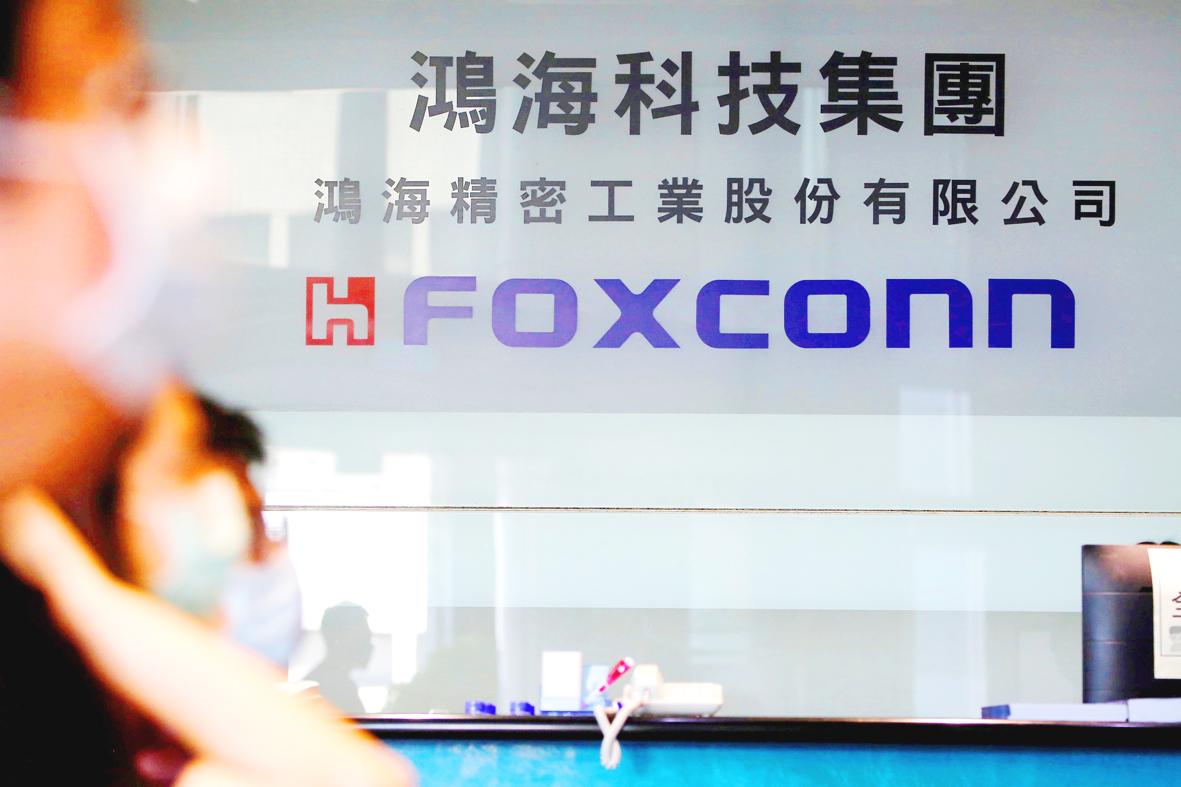Hon Hai Precision Industry Co (鴻海精密) yesterday reported consolidated revenue fell 9.08 percent from a year earlier to NT$360.53 billion (US$12.20 billion) last month, ending two consecutive months of annual increases.
Last month’s figure was down 6.83 percent from May, after rising three months in a row on a monthly basis, company data showed.
A sales breakdown showed that cloud and Internet products were the largest contributors to revenue last month for the leading assembler of Apple Inc’s iPhones, while consumer electronics provided the least support.

Photo: Ann Wang / Reuters
Hon Hai said that revenue for the second quarter improved to NT$1.13 billion, up 21.38 percent from NT$929.68 million in the first quarter, which was the lowest quarterly result in six years as the market was negatively affected by the COVID-19 pandemic.
On an annual basis, last quarter’s figure declined 2.77 percent from NT$1.16 billion, company data showed.
Overall, Hon Hai’s cumulative revenue in the first half of the year was NT$2.06 billion, down 7.16 percent from a year earlier, the company said.
Separately, telecom equipment maker Sercomm Corp (中磊) said that revenue surged 44 percent year-on-year to NT$3.63 billion last month, lifting last quarter’s revenue to NT$9.25 billion, a 38 percent annual rise.
Sercomm attributed the growth to delayed orders and rising customer demand for increased bandwidth and broadband upgrades due to work-from-home and videoconferencing trends amid the pandemic.
It is optimistic about its business outlook as its new small cell base stations and networking equipment supporting 5G technology are being adopted by more telecoms, Sercomm said.
The company’s production capacity has fully recovered, it said.

ADVANCED: Previously, Taiwanese chip companies were restricted from building overseas fabs with technology less than two generations behind domestic factories Taiwan Semiconductor Manufacturing Co (TSMC, 台積電), a major chip supplier to Nvidia Corp, would no longer be restricted from investing in next-generation 2-nanometer chip production in the US, the Ministry of Economic Affairs said yesterday. However, the ministry added that the world’s biggest contract chipmaker would not be making any reckless decisions, given the weight of its up to US$30 billion investment. To safeguard Taiwan’s chip technology advantages, the government has barred local chipmakers from making chips using more advanced technologies at their overseas factories, in China particularly. Chipmakers were previously only allowed to produce chips using less advanced technologies, specifically

BRAVE NEW WORLD: Nvidia believes that AI would fuel a new industrial revolution and would ‘do whatever we can’ to guide US AI policy, CEO Jensen Huang said Nvidia Corp cofounder and chief executive officer Jensen Huang (黃仁勳) on Tuesday said he is ready to meet US president-elect Donald Trump and offer his help to the incoming administration. “I’d be delighted to go see him and congratulate him, and do whatever we can to make this administration succeed,” Huang said in an interview with Bloomberg Television, adding that he has not been invited to visit Trump’s home base at Mar-a-Lago in Florida yet. As head of the world’s most valuable chipmaker, Huang has an opportunity to help steer the administration’s artificial intelligence (AI) policy at a moment of rapid change.

TARIFF SURGE: The strong performance could be attributed to the growing artificial intelligence device market and mass orders ahead of potential US tariffs, analysts said The combined revenue of companies listed on the Taiwan Stock Exchange and the Taipei Exchange for the whole of last year totaled NT$44.66 trillion (US$1.35 trillion), up 12.8 percent year-on-year and hit a record high, data compiled by investment consulting firm CMoney showed on Saturday. The result came after listed firms reported a 23.92 percent annual increase in combined revenue for last month at NT$4.1 trillion, the second-highest for the month of December on record, and posted a 15.63 percent rise in combined revenue for the December quarter at NT$12.25 billion, the highest quarterly figure ever, the data showed. Analysts attributed the

Taiwan Semiconductor Manufacturing Co’s (TSMC, 台積電) quarterly sales topped estimates, reinforcing investor hopes that the torrid pace of artificial intelligence (AI) hardware spending would extend into this year. The go-to chipmaker for Nvidia Corp and Apple Inc reported a 39 percent rise in December-quarter revenue to NT$868.5 billion (US$26.35 billion), based on calculations from monthly disclosures. That compared with an average estimate of NT$854.7 billion. The strong showing from Taiwan’s largest company bolsters expectations that big tech companies from Alphabet Inc to Microsoft Corp would continue to build and upgrade datacenters at a rapid clip to propel AI development. Growth accelerated for